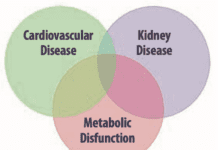You know that sugar can pad your waistline and cause cavities, but does too much sugar in your diet also contribute to unhealthy cholesterol levels? Thats the conclusion of the first study of its kind to look at the link be-tween consumption of sugar added to processed foods and measures of blood cholesterol known to raise the risk of heart disease.Last year, the American Heart Asso-ciation issued a statement recommend-ing reductions in added sugar. Now this large epidemiological study, using data from the long-running National Health and Nutrition Examination Survey (NHANES) from 1999 through 2006, adds to the evidence behind such advice.Americans get nearly 16% of our total calories from sugars added to foods during manufacturing-invisible calories hiding even in foods that may not necessarily taste sweet. That figure is up sharply from 1977-78, when added sugars contributed 10.6% of daily calories for the average adult. Today, daily consumption averages 90 grams of added sugar, the equivalent of 21.4 teaspoons.Researchers Jean A. Welsh, MPH, RN, of Emory University, and col-leagues noted, In the United States, to-tal consumption of sugar has increased substantially in recent decades, largely owing to an increased intake of added sugars, defined as caloric sweeteners used by the food industry and consum-ers as ingredients in processed or pre-pared foods to increase the desirability of these foods.To see if higher intake of added sugar might be associated with cho-lesterol levels, Welsh and colleagues divided 6,113 NHANES participants into five groups based on the percent-age of total calories from added sugars. Groups ranged from less than 5% (the equivalent of three teaspoons of sugar a day) to 25% or more of daily calories from added sugar (an average of 46 teaspoons of added sugar per day). Results were weighted to be representa-tive of the US population as a whole, and data were adjusted for confound-ing variables, including BMI, physical activity, total energy intake and other dietary components.With increasing consumption of added sugar, average levels of the good HDL cholesterol were lower and levels of unhealthy triglycerides were higher. HDL cholesterol went from an average of 58.7 mg/dL in the group consuming the least added sugar to 47.7 mg/dL in the group getting the most. Triglyc-erides went from 105 mg/dL to 114 mg/dL as calories from added sugar increased. A similar trend was observed for the bad LDL cholesterol, but only in women.Compared with the lowest-sugar group, participants with the highest intake of calories from added sugars were more than three times as likely to have unhealthy HDL cholesterol levels. That high-sugar group was also more likely to have high triglycerides and an unhealthy ratio of triglycerides to HDL cholesterol. (For more on cholesterol, see our May 2010 Special Report.) The findings were published in the Journal of the American Medical Association.
| Sugar Smarts The American Heart Association recommends that most women consume no more than 100 calories daily of added sugar (25 grams, about 6 teaspoons) and men limit added sugar to 150 calories a day (37.5 grams, 9 teaspoons). To keep added sugar in check, the association suggests: Look for these terms on food labels, indicating added sugar: brown sugar, corn sweetener, corn syrup, fruit juice concentrates, high-fructose corn syrup, honey, invert sugar, malt sugar, molasses, raw sugar, sugar, sugar molecules ending in -ose (dextrose, fructose, glucose, lactose, maltose, sucrose), syrup. Buy sugar-free or low-calorie beverages. Buy fresh fruits or fruits canned in water or natural juice. Add fresh or dried fruit to cereal instead of sugar. Enhance flavors with spices instead of sugar. Substitute unsweetened applesauce for sugar in recipes (use equal amounts). Use zero-calorie sweeteners in moderation. |
The study wasnt designed to show cause and effect, and its possible that added sugar intake is actually a marker for larger dietary patterns. Higher consumption of added sugar was associated with participants who were more likely to be younger, poorer and black. In higher-intake groups, calories from added sugar replaced calories from all other nutri-ents, including all types of fat.Monitoring trends in consumption and understanding the effect added sug-ars have on risk of cardiovascular and other diseases is critically important, because added sugars are a potentially modifiable source of calories, Welsh and colleagues concluded. Added sugars are food additives that can be recognized by consumers and have been proposed for specific labeling on food and beverage packaging. The results of our study demonstrate that increased added sugars are associated with important cardiovascular disease risk factors.… Our data support dietary guidelines that target a reduction in consumption of added sugar.The Dietary Guidelines for Ameri-cans are currently being updated for release later this year. Added sugar-at least in the form of sweetened soft drinks-is among the topics on the table for changes in the 2010 recommenda-tions.TO LEARN MORE: JAMA, April 21, 2010; abstract at jama.ama-assn.org/cgi/content/full/303/15/1490. American Heart Association scientific statement circ.ahajournals.org/cgi/reprint/CIRCULATIONAHA. 109.192627.























